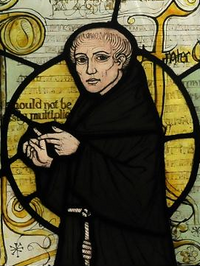Even among those who do not study philosophy, it is quite well known that William of Ockham, the man behind “Ockham’s Razor,” tried to disprove the idea of a human soul. In philosophy, a razor is a device that is used to shave away unnecessary explanations, which is precisely what he is said to have done to the idea of the human soul.
human soul. In philosophy, a razor is a device that is used to shave away unnecessary explanations, which is precisely what he is said to have done to the idea of the human soul.
William of Ockham received his degree from Oxford University after his studies when, for his final exam, he taught a one year course on the theology of Peter of Lombard, a theologian of the generation before. In those lectures, William challenged the accepted theological standard of the time, that one could reason from the particulars of our existence to necessary supernatural realities like a divine soul. I said that William received his degree, but he never actually got the teaching position that goes with it because those lectures angered the pope who summoned him for a trial, leading to his excommunication.
William became famous after he died, for his philosophical method, today called Ockham’s Razor. Ockham’s Razor was simply his perferred parsimonious explanation of events, the explanation with fewest assumptions are preferred, or as he put it, “what can be done with few assumptions is done in vain with more.”
Over time, poor William of Ockham’s status as a theologian was lost, and now he is just that bogey man out to dismantle the idea of faith and the soul. But this characterization is unfair. It’s also unfair to expect William to know what Tupperware is, but if he did, he would understand and agree with the philosophical importance of this story:
One evening after dinner, a five year-old boy asked his father, “Where did Mommy go?”
His father told him, “Mommy is at a Tupperware party.”
This explanation satisfied the boy for a moment, but then he asked, “What’s a Tupperware party, Dad?”
His father figured a simple explanation would be best. “Well, son,” he said, “at a Tupperware party, a bunch of ladies sit around and sell plastic bowls to each other.”
The boy burst out laughing, “Come on, Dad! What is it, really?”
William of Ockham, would have laughed too. Sometimes the simplest explanation does not entirely explain.
Not just with Tupperware either. Maybe the very word “soul,” over which argument has raged can be usefully understood.
A new book about the role of the humanities in democracy, called Not for Profit, tries to usefully employ the word. To maintain a vital democracy, says Martha Nussbaum, we must be willing to see more behind democracy than method — we must be willing to say, “Com’on what is it really?”
Nussbaum suggests that in order to talk about this “thing” behind democracy, we use various words, including the word soul, and mean by it, “the faculties of thought and imagination that make us human and make our relationships rich human relationships, rather than relationships of mere use and manipulation.”
The simplest explanation of a person will not serve a democracy. We are charged to somehow imagine our neighbor, be they rich or poor, black or white, straight or gay, as souled. I think William of Ockham would agree.
I offer a moment of silence in which to reflect on this most human of tasks. . .
Amen.